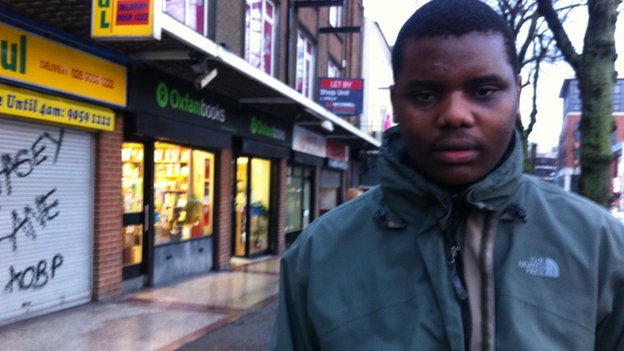Nowhere to go: Life as a destitute asylum seeker in Belfast
By Chris Page | BBC Northern Ireland |
Stanley Phiri cannot take the most basic of needs for granted. The 21-year-old Zimbabwean has no permission to work and is dependent on charities to feed and clothe him. I met him at Common Grounds coffee shop in south Belfast, where he volunteers.

“I’m trying to keep myself busy. I try to get involved in different organisations. It helps me to reduce the stress in my life,” he said.
I spent an afternoon with Stanley, to get an idea of what his hand-to-mouth life in Belfast is like.
He gets most of his clothes from two charity shops.
He looks for the items he would like, about four every month, then he goes back to the hostel where he lives. The charity that runs that hostel, the Simon Community, writes a letter for him so he can pick up the clothes.
He explained how he buys food with the £20 a week he gets from another charity, the Society of St Vincent de Paul.
Asylum seekers are often at the extreme end of the poverty spectrum.
They come from several dozen countries, often the ones that feature in news headlines about conflict. The Home Office does not collect figures specifically for Northern Ireland but the statistics from charities and some statutory organisations give a general picture.
Most estimates put the number of asylum seekers in Northern Ireland at the moment at between 400 and 500. Somalis have been the biggest group in recent years, but people have come from several dozen other countries, including Sudan, the Democratic Republic of Congo, and, most recently, Syria.
The Home Office assesses whether an application for asylum is valid, based on the 1951 UN Convention on Refugees. It obligates countries to take in people who are have a “well-founded fear of being persecuted for reasons of race, religion, nationality, membership of a particular social group or political opinion”
Those whose asylum applications are successful are initially granted permission to stay for five years. Then their status is reviewed to see if they will be allowed to stay permanently. Successful applicants cease to be asylum-seekers and are officially termed “refugees”.
The latest UK-wide figures, for the 12 months to March 2013, show that around 37% of asylum seekers were granted permission to stay. But some whose applications are rejected do not go home immediately.
This can be for a number of reasons.
They might appeal the decision, as Stanley Phiri is doing.
Their home countries may not have them back, or it may not be safe to return.
People in this position are officially classed as “destitute” and entitled to what is called Section 4 support.
Voluntary organisations are aware of at least 20 families and 14 individuals in Northern Ireland who are in this situation at the moment. They get £35 per week to live on, which comes on a special payment card that can only be used in about nine retailers.

Invariably, asylum seekers in this position rely on charity hand-outs.
Neil McKittrick, from the Red Cross, says organisations like his fill a critical gap.
“The fear for us is that if people weren’t being seen by charities like the Red Cross, where else would they turn?” he says.
“For us the fear would be that the ultimate would happen and someone would die of starvation or could end up sleeping rough in Botanic Park in the cold weather.
Bryson Intercultural is the charity that looks after asylum seekers when they initially arrive in Northern Ireland. Its director Jo Marley said the situation by which people do not have permission to stay and yet cannot go home is a “conundrum”.
“I think what we struggle to get our heads around is that they live here on the kindness of others with total insecurity about how they’re going to manage – yet it’s still better than going back” she said.
She is keen to emphasise that asylum seekers do not come to Northern Ireland to take advantage of state benefits.
Kind
Indeed, many of them not aware of even the concept of a welfare state before they come to the UK, she said. I have not met a group of people who have been so thankful for the opportunity to tell their stories.
One point they all wanted to make was that their support network in Northern Ireland. friends, churches, volunteers, has kept them going. Recent headlines about hate crimes might give the impression that Northern Ireland is an unwelcoming place.
But, going deeper, we have discovered a society that is warm, generous and kind to strangers.
Norma Nyamambi is from Zimbabwe and a member of the Friendship Club, in which people from many different nations meet in south Belfast on a Thursday evening. She is destitute and said the club, and the friends that she has made there, have been a lifeline to her.
“When I first came to Northern Ireland, I had nowhere to go,” she says, “but Friendship Club became my home.”
“It’s really hard to be destitute in this country but if you come as an asylum seeker and introduce yourself to the community, they will help you.”
“These people make me see I have a new life.”
Nowhere To Go will be broadcast on BBC Radio Ulster and BBC Radio Foyle on Sunday 16 February 2013 at 13:30 GMT. It will then be available on BBC IPlayer.






